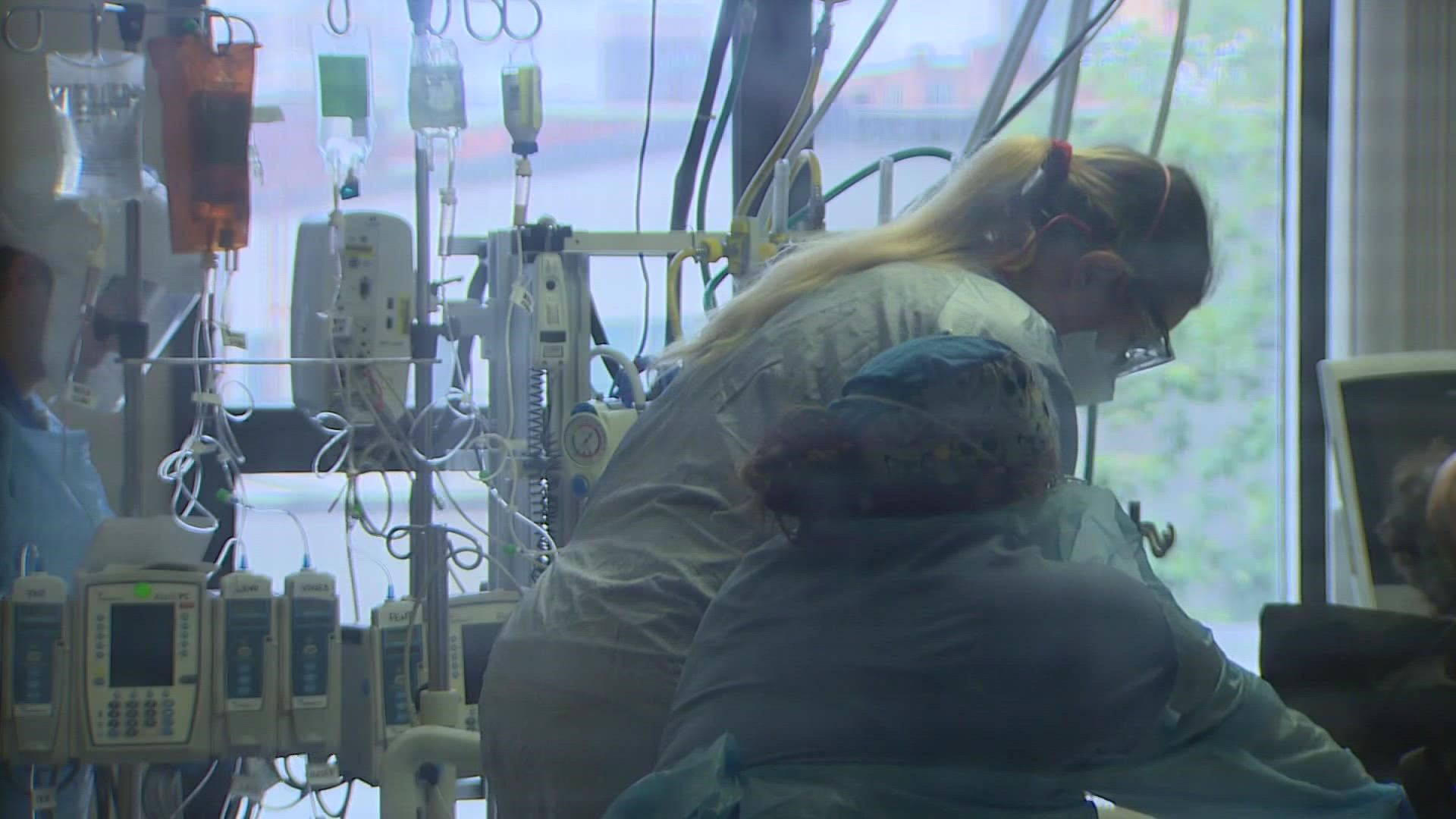SEATTLE — The COVID-19 pandemic is hitting Washington state hospitals harder than it ever has, especially hospitals in the Puget Sound region where the omicron surge is driving case counts to record levels.
“We are closer to a crisis situation than we have ever been,” said Dr. John Lynch, medical director of infection control at the University of Washington’s Harborview Medical Center.
During the Washington State Hospital Association’s (WSHA) Thursday morning briefing, one that CEO Cassie Sauer described as the “most depressing” briefing of the pandemic, health leaders sounded the alarm even louder on what could be at stake in the coming weeks if current projections hold.
Sauer said as of Wednesday, there are 1,187 COVID-19 patients hospitalized across the state, with another 100 patients suspected of having the virus.
Of those patients, 127 of them are on ventilators.
The most recent 7-day average for COVID-19 patients hospitalized across the state is 1,248. Just one month ago, the 7-day average was just over half that at 664 patients.
The uptick in hospitalizations is believed to be driven by the omicron surge, which is spreading much more rapidly than any previously seen variant of the virus, but Sauer noted Thursday that the delta variant hasn’t disappeared either.
Describing the dominance of the omicron variant, Medical Director for Infection Control and Prevention at EvergreenHealth Dr. Francis Reido said, “I liken it to a marathon race with 10 billion contestants. This omicron has surged to the front. It’s the fastest, the fleetest, it’s been reinforced, it gets into cells very quickly, very easily, multiplies rapidly and then spreads quickly.”
Even with most patients experiencing only minor symptoms, Sauer called the issue a “math problem,” as WSHA Executive Vice President Taya Briley has pointed out before.
“You have so many more people that are infected, that even a small percentage of a big number is a big number,” Sauer explained.
However, the rise in COVID-19 patients is only compounding a capacity problem that already existed largely due to patients who were difficult to discharge because of things like legal guardianship requirements and staff shortages in long-term care facilities.
“We were already dealing with an incredibly high capacity across our facilities,” said Lynch. “Most of our facilities were at or over 100% capacity before this surge, and then adding the additional need and demand for patients with COVID has put us well over that 100% capacity that we're already at.”
Sauer said that WSHA is asking the Washington State Legislature, which goes into session next week, to reinterpret state law so that family members do not need legal guardianship to sign off on someone being moved from a hospital to a nursing facility. WSHA has also asked the state to see if Gov. Jay Inslee can accomplish this via an emergency order.
Sauer also said that WSHA is asking the state to send strike teams to help alleviate staffing shortages at long-term care facilities.
These demands were echoed in a letter sent to Inslee and State Secretary of Health Dr. Umair Shah by the Washington State Medical Association (WSMA), a group of over 12,000 medical professionals.
In the letter, WSMA President Dr. Mika Sinanan requests that Inslee and Shah officially declare a crisis in the state’s health care system.
“Patients are suffering, we are suffering,” Sinanan writes, adding, “No physician wants to turn patients away, but we simply can’t carry on this way any longer.”
The letter requests an increase in incentives for long-term care facilities for serving discharged patients, an increase in the Department of Social and Health Services to hire more staff, the immediate removal of barriers in the process of discharging patients and the activation of the National Guard to assist with staffing shortages at all medical facilities.
Shah said Thursday morning that he was not aware of the letter, but added, “We do believe that we are in a very difficult time in our health care system.”
As for Washingtonians, Sauer said hospitals are making four urgent requests:
- If you have mild COVID symptoms or are looking for a test, do not go to emergency rooms. By law, hospitals must screen everyone who comes to them for care, and minor cases are straining resources in emergency departments.
- Upgrade your mask to either a surgical mask, KN95 or N95. Those still wearing cloth masks should layer it with at least a surgical mask to up its protection.
- Avoid doing in-person activities for at least the next few weeks. UW researchers predict COVID-19 cases in Washington will increase to 40,000 per day by the end of January or the beginning of February, making the rest of the month crucial in keeping hospitalizations as low as possible.
- Get vaccinated and a booster dose if you haven’t already.
“I think we need to step outside of ourselves for just a moment to consider the broader impact of our actions or more specifically our inactions when it comes to taking appropriate precautions,” Riedo said. “That includes being boosted or vaccinated. It also includes not getting together and having large parties, gathering in groups, doing behaviors that at this point will only contribute to the spread of this virus.”

